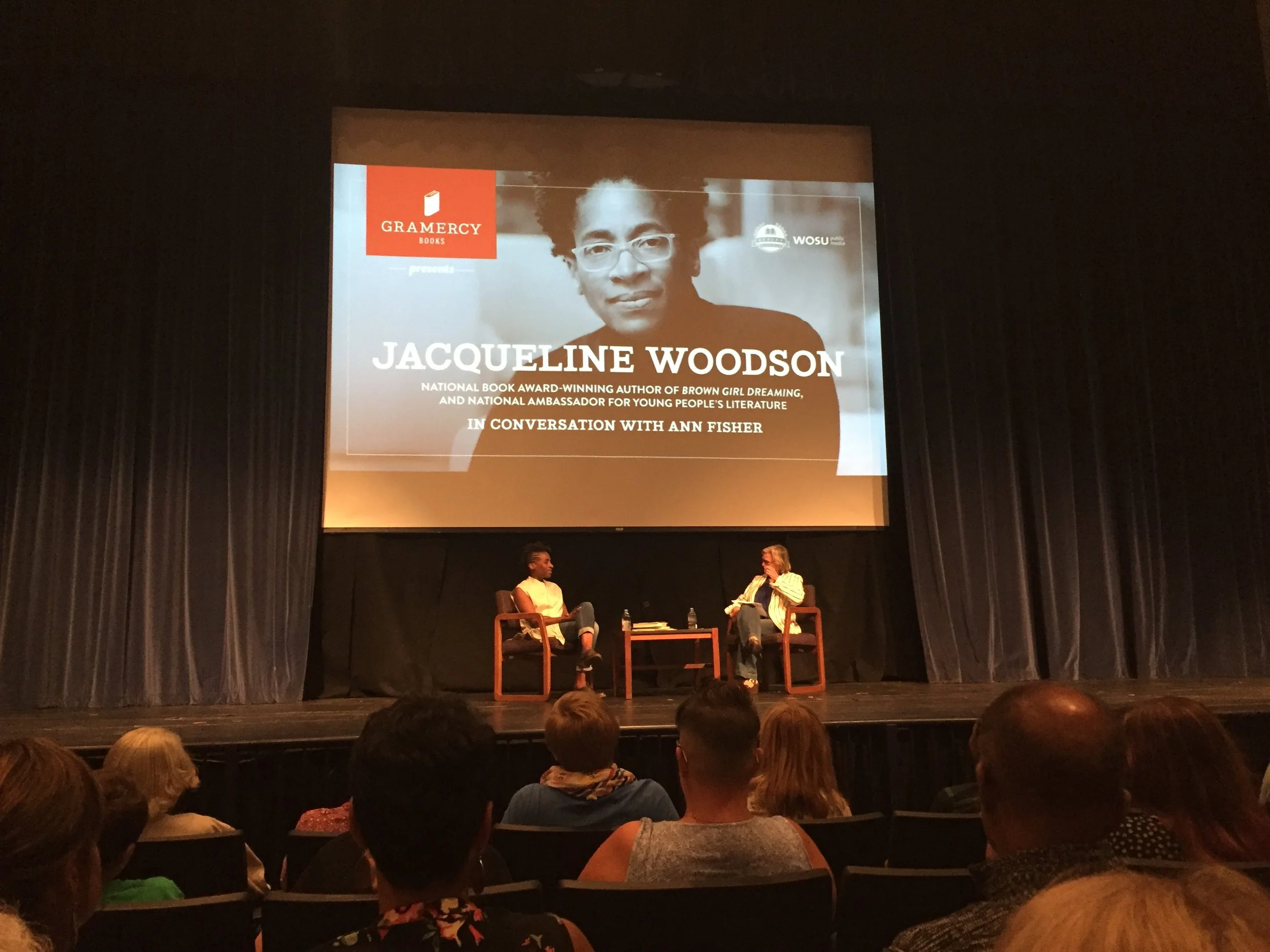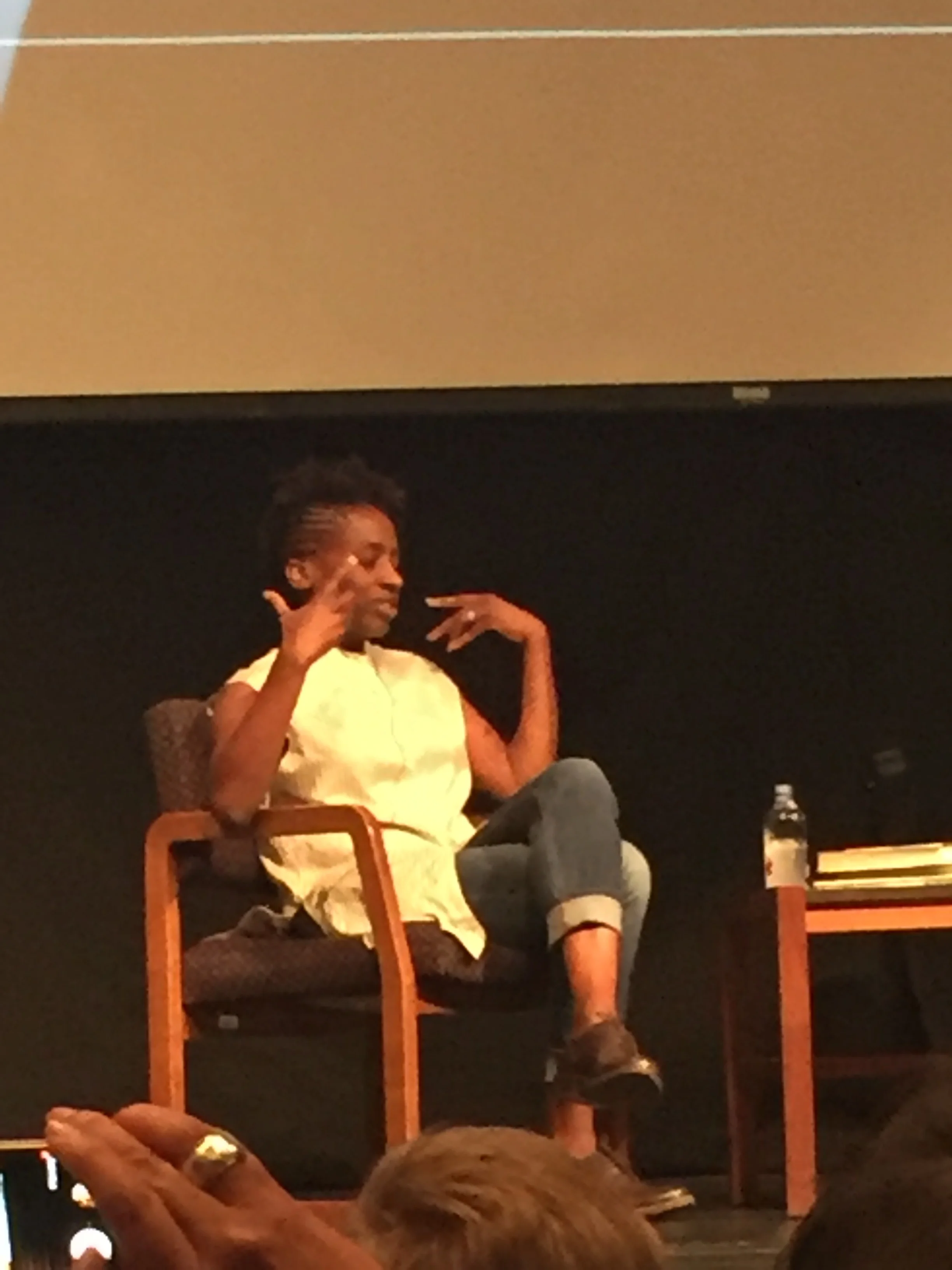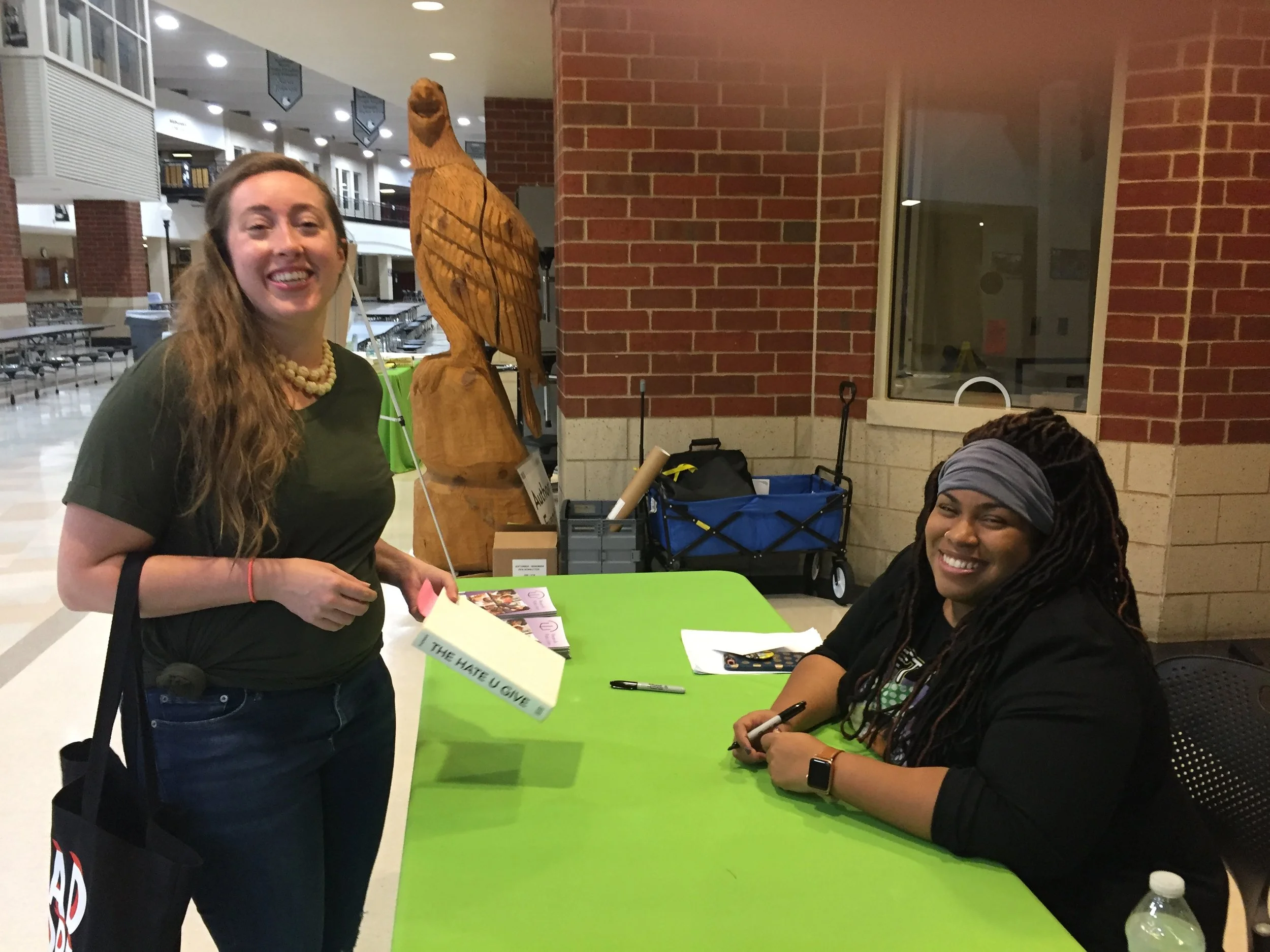An Evening with Jacqueline Woodson
Despite being an avid reader, sometimes I miss an author who everyone seems to love but whom I've never read. Until a year ago, Jacqueline Woodson was that author for me. But then I read Brown Girl Dreaming and I knew she wasn't one to sleep on. She's currently on book tour for her newest books, a middle-grade novel called Harbor Me and a picture book called The Day You Begin and I was lucky enough that she stopped in my city!
[image description: Photo of the stage Jacqueline Woodson spoke on. I was seated several rows back, so the rows in front of me and the people sitting in them are visible at the bottom of the picture. Onstage, Jacqueline Woodson (a black woman) and the person interviewing her (a white woman; more on her in the next paragraph) are sitting with their chairs angled slightly toward each other but where the audience can still see their faces. Above their heads are royal blue curtains and a big dangling screen with Jacqueline's author photo and copy advertising the event.]
The event was put on by local indie bookstore Gramercy Books and thanks to them and Jacqueline, the event was wonderful. I make a point of saying that only because the interviewer was... shall I say, oblivious. It seemed like this interviewer did little to no research on Jacqueline and was just winging it. And several of her questions were socially unaware, even going as far as to imply that people are only just now talking about issues like immigration and police brutality, as if communities of color haven't been talking about this stuff for decades.
But I digress. Jacqueline redirected the questions and set the record straight with grace and aplomb each time, though that wasn't work she should've had to do.
The real gem was the Q&A after the interview where the audience got to ask questions. Being conscious of the rather non-diverse space I was in, I wanted to be respectful and not center my voice, so I avoided asking a question.
Instead, I took notes while others asked questions and I'm sharing Jacqueline's wisdom below. Note that I was writing as fast as I could, but I couldn't capture her quotes verbatim. I did my best, so although what I attribute to her is in quotation marks, I don't recommend taking it word-for-word.
[image description: Jacqueline Woodson on stage at the event. She's a tall, slender black woman in cuff jeans, a cream colored tunic, and brown dress shoes. She's sitting in a wooden chair with her legs crossed and hands together.]
Of course, there was the question from a teenager who's an aspiring writer. She wanted to know how long it took to write her books.
Answer: "Brown Girl Dreaming took about three years to write, but I did 30 rewrites. Harbor Me took and year and a half to write, but I'd been thinking about it for a year before then. Miracle's Boys took four years to write.
"I Hadn't Meant to Tell You This, which is a book set in Chauncey, Ohio, took three weeks to write. And of course I thought to myself once I wrote that one in three weeks all the other books would take three weeks to write, but that just didn't happen. I usually write multiple books at once, though.
"It was a long time before I admitted that I wanted to be a fiction writer. My family told me that if I was going to be a writer I should be a journalist because I'll get a paycheck, but I didn't want to tell the truth. The characters in my head were much more interesting. So growing up I'd tell the adults I was going to be a journalist when really I knew I was going to make up stories."
[image description: My signed copy of Brown Girl Dreaming. The photo is a close up of the title page where it has the title and author. The signed part says "For Mandy / With love / Jacqueline Woodson"]
Brown Girl Dreaming is one of Jacqueline's most popular, beloved, and award-winning books and it's her only work of nonfiction. On that she had this to say:
"It was a long time before I wrote about myself. By the time I started thinking about writing the book that would become Brown Girl Dreaming I had over 150 awards and my books were in all these different languages, so I asked myself 'how did I become a writer? How did I get here?'
"So I started writing down all the memories I could access. My mom died while I was writing the book, so I was writing and grieving at the same time. After my mother's death, the book became more about her. I also relied on my aunt, who's the family historian and genealogy expert.
"Brown Girl Dreaming was the first book where I got emails from 70-year-old white men and 10-year-old black boys and everyone in between. People would email me to say they knew my grandfather back in the day or they knew someone else in my family.
"When you look at all the stories coming at me from religion, genealogy, geography, family, and history, there was no way I wasn't going to become a storyteller."
[image description: My signed copy of Another Brooklyn. The photo is an up close of the title page with the author, title, and publisher. This one isn't personalized to me, so the signed part is just Jacqueline's signature.]
Someone also asked about Jacqueline's editing process and what she looks for when asking for feedback.
"I have three people I usually ask for feedback from before I send off my manuscript. One of those people is my husband and another is a fellow writer friend. The key is to ask for really specific things.
"The first time they read it I say tell me what you love. I want to know what they like about it and what sticks out to them. Then I say to ask me three questions. That helps me figure out what's confusing or what they're wondering about and how I can answer those questions. Then I say let's talk about where I can expand. What do they want to know more about?
"I don't ask for what's not working because that's going to make me not want to write it."
A related question was asked about how Jacqueline deals with revision and rejection.
"When you've revised your manuscript at least 15 times, then send it out. And always be ready to send it somewhere else if it's rejected. My first book was bought and I had to rewrite it 20 times and three years later it was published. Publishers want to see that you can take feedback and listen.
"No matter what you do, everything is going to get to that point where it gets hard. Ask yourself why it's hard and why you want to do it. If it's what you really want to do, you have to push through or you’ll end up with a lot of half-finished books.
"Publishing shouldn’t be the end goal. Joy should be the goal. If you love it, you’ll be happy to rewrite it.
[image description: My signed copy of Locomotion. The photo is an up close of the title page with the author, title, and publisher. The signed part is Jacqueline's signature without any personalization.]
Someone also asked what writers inspire Jacqueline and who she's reading now. She recommended Brit Bennett (author of The Mothers), Angela Flournoy (author of The Turner House), Hanif Abdurraqib (who was in the audience and is the author of The Crown Ain't Worth Much and They Can't Kill Us Until They Kill Us), Danez Smith (poet and author of Don't Call Us Dead), James Baldwin, Langston Hughes, Terrance Hayes (poet), Cornelius Eady (poet and author of You Don't Miss Your Water), and Tommy Orange (author of There There).
On a personal note, I've read works by everyone on the list except Danez, Terrance, and Cornelius and her recommendations are spot on. They're all fantastic.
[image description: Another shot of Jacqueline onstage. The heads and hands of people in the rows in front of me can be seen at the bottom of the photo, then Jacqueline is sitting in a chair onstage. Her legs are crossed and her hands are up, animating what she's saying.]
Someone also asked about the challenge of trying to write about big issues and topics in an age-appropriate way and how some people believe children need to be shielded from the hard realities of the world.
"The idea of trying to protect children is a myth. Whether we’re talking about it or not, children are hyper-aware. People who write for kids know how to do this.
"The first time I read The Bluest Eye by Toni Morrison I was about 10 years old and I thought the book ended with her getting blue eyes and living happily ever after. Then I read it again in high school and was shocked because that's not how it ended at all. Children compartmentalize. Children get what they get and they’ll leave the rest for later.
"It’s really about the tone we set as teachers, parents, and caregivers. If we’re uncomfortable talking about some subjects, they’re going to think they can’t think about it or talk about it. It’s also about how we present the book. Don’t say 'this is a book about an African American girl' when talking about one of my books and then say 'this is a book about a girl' when talking about a Judy Blume book. Why does one get a qualifier and the other doesn’t?
"We have to be careful with our words. If we’re not careful with our words, we can make kids feel less than. Like saying "ask your mom and dad." What if that kid doesn't have a mom and dad? What if they only have one or are raised by their grandparents? Or if a teacher says "boys on this side and girls on that side." What if they don't identify as a boy or girl?
"Not addressing our differences to kids doesn't mean those differences aren't there. It just makes the kids who have these identities or experiences feel like there's something wrong with them when there's not."
[image description: Jacqueline Woodson signing my copy of Brown Girl Dreaming. She's onstage sitting at a long white table and I'm standing across from her while she's signing my book. We're both looking at the camera and smiling.]
And after her talk and Q&A, Jacqueline signed our books! I was lucky because I got there early and only had to wait about 45 minutes to get mine signed. I imagine the people at the back of the line had to wait at least 2.5 hours.
I had a great time, so if you see Jacqueline coming to your town, I highly suggest getting tickets to see her!



![[image description: Jacqueline Woodson on stage at the event. She's a tall, slender black woman in cuff jeans, a cream colored tunic, and brown dress shoes. She's sitting in a wooden chair with her legs crossed and hands together.]](https://images.squarespace-cdn.com/content/v1/53cb0ed6e4b01d2bd00e3633/1536507518348-VDPMHO799EI8R1HSQS6Z/IMG_9374.JPG)
![[image description: My signed copy of Brown Girl Dreaming. The photo is a close up of the title page where it has the title and author. The signed part says "For Mandy / With love / Jacqueline Woodson"]](https://images.squarespace-cdn.com/content/v1/53cb0ed6e4b01d2bd00e3633/1536508229096-DHDABX85MFQ10ZAR2PP2/IMG_9395.jpg)
![[image description: My signed copy of Another Brooklyn. The photo is an up close of the title page with the author, title, and publisher. This one isn't personalized to me, so the signed part is just Jacqueline's signature.]](https://images.squarespace-cdn.com/content/v1/53cb0ed6e4b01d2bd00e3633/1536508842461-OWPRYFOQ5F0Y07NULO6G/IMG_9393.JPG)
![[image description: My signed copy of Locomotion. The photo is an up close of the title page with the author, title, and publisher. The signed part is Jacqueline's signature without any personalization.] ](https://images.squarespace-cdn.com/content/v1/53cb0ed6e4b01d2bd00e3633/1536510625317-I60SGZV9M4NPO6HESS7E/IMG_9394.jpg)

![[image description: Jacqueline Woodson signing my copy of Brown Girl Dreaming. She's onstage sitting at a long white table and I'm standing across from her while she's signing my book. We're both looking at the camera and smiling.]](https://images.squarespace-cdn.com/content/v1/53cb0ed6e4b01d2bd00e3633/1536511594559-2DIDNOOI3BJXZ7F89K62/IMG_9376.JPG)




